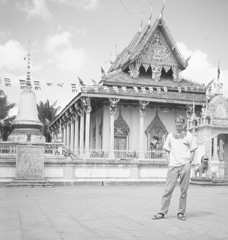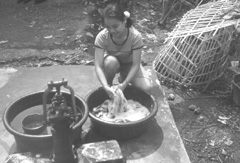
While luxurious hotels of the Western variety tend to be limited to the big cities, as a budget traveler you will almost always find a cheap place to stay no matter where you are in Southeast Asia. The most popular form of budget accommodation is known as the guest house, which essentially has no counterpart in the Western world. Think of it as a super cheap motel. Due to the increasing number of budget travelers to the region and the easing of governments’ economic and political policies, there has been a boom in private guest house construction. Consequently, you will often find that you have several clean, new places from which to choose to bunk for the night.
Guest houses generally offer private rooms with fake linoleum or cement floors, a small side table, and one or two single beds, although a double bed might serve as a "double room" as well. Your room will almost always come with a fan (overhead or mobile plug-in) or mosquito net or both. Unfortunately, electricity is erratic in rural areas, so the fan may unexpectedly shut off, leaving you to wallow in stifling, thick air for much of the night. Often these "rooms" are simply parts of a previously larger room that has been partitioned with cheap fiberboard or plywood, but this shouldn't really be a problem unless other guests are being rowdy (or unless you and your significant other need a quiet place). Some guest houses have a dormitory, where several people sleep in the same room, both side by side and in bunks stacked atop one another. Here, security and prices are low. You should always be provided with clean sheets. If your bed looks dirty, ask for clean sheets or just go somewhere else. Usually a threat to go elsewhere will skip them into action -- the power of a dollar.
Cold water showers and squat toilet facilities are sometimes attached to the room, but if you're saving money these will be located down the hall, upstairs, around the corner, or simply out back, where they are shared with the other patrons of the guest house. Keep in mind that "shower" does not always mean a pipe above your head. Sometimes you have to settle for the bucket wash, whereby you bathe yourself by scooping water from a large basin and pouring it over your body. Hot water is sometimes available, but again, it comes at a price. It's so hot in the tropical world you'll come to really appreciate a cold water shower after a day of sweat and grime on the town.
In South and Southeast Asia you should NEVER pay more than $5.00 per night for one of these rooms or a dorm bed. Generally the cost will be around $2-3. Always bargain, because half the time you'll get a discount off the originally quoted price. A great example is the typical Burmese guest house. They all assume that white people like to have fried eggs, toast, bananas and coffee for breakfast, so they include it with the room charge. Since far more interesting noodle concoctions (mohinga) can be had out on the street in every village and city, tell them when you check in that you don’t want the breakfast, and they’ll typically knock off $0.50-1.00 per night if you ask. Finally, remember to check out your room and bath facilities before you hand over any money. Although your standards will be lower than back home, once in a while you will still come across a real dump that you just don’t feel like paying for.

Sometimes guest houses have great views (Cambodia).
Nicer guest houses, or "hotels," are available in all of the moderately sized and larger towns, even in Burma and Cambodia. These places are usually spotless, feature a front lobby, attached bath with Western toilet, television, carpeting, and perhaps a downstairs restaurant or karaoke bar. Local businessmen and wealthier tourists stay here, where prices are generally around $10-20 per night.
If you're off the beaten path, in remote small towns and villages, you may occasionally find that there is no formal place to stay. In this case, any of a number of options are open to you. Start walking around, and if some kid doesn't run up and grab your hand while yelling "hotel, hotel" within a few minutes, congratulations! You're in luck, for you have stumbled across one of those rare places where people are not dying to make money off of you. These are the unspoiled, exotic places of SE Asia. Savor the moment. They do exist, I promise. If you're north of Malaysia, try looking for a Buddhist temple. Many monks are friendly, educated people who are willing to help foreigners in need. Chances are that one of them will speak English too. If you're a guy, ask if you can stay with them, if they don't offer first. If you're a woman, ask anyway and they'll do their best to help. If you've learned some of the local language, ask around for accommodation, because chances are that some house in town serves as the unofficial guest house for those rare occasions when the village has a visitor (such as when a provincial officer comes to town).

Be one with the monks...

... and this could be your home (Cambodia).
For maximum cheapness, if you're really bent on learning about the lands and peoples around you, you need to make some local friends (see 10. how to meet locals and 11. how to eat). Do not ignore this possibility, because if you're friendly and open to others, then the invitations will come. I'm convinced that it's quite possible to spend at least 25% of your nights in the homes of locals, especially in the poorer, less touristy countries of Bangladesh, Burma, Laos, Cambodia and northern Thailand. People question safety in these situations. I say I'd trust a Cambodian's invitation any day before I trust an American's invitation. Violent crime is almost nonexistent in these peaceful countries.
For the really adventurous, sleeping out under the stars is always a possibility. Away from the mountains, it rarely gets cold enough in SE Asia to make you uncomfortable. Put on all your shirts, find a nice grassy or sandy area away from the streets, lay down your sarong and enjoy nature at its finest. Beaches are the most accepted places to sack out. Most countries don’t really enforce any sort of vagabond laws. Chances are, if someone asks what you’re doing and you simply tell them that guest houses are too expensive, they’ll find more affordable accommodation for you, or maybe invite you to stay with them.
In some cases you may find that you arrive at a bus or train station in the evening and the connection to where you want to go doesn’t leave until the next morning. This is most likely to happen in Malaysia and Thailand, where cross-country travels are not uncommon among the locals. You can either hunt around town for a place to sleep for a few hours, or you can sack out on the benches. These stations generally have people hanging around all night, doing the same type of thing you are, so they’re quite safe. Put your bag under your head as a pillow, take off your sandals, remove valuables from exposed pockets, and get comfortable.
If these scenarios sound strange to you, remember that everything you do is part of the travel experience. Back home maybe you would always stay in a motel or campground, because you have things to do and places to go, but on the road it’s a different mentality. Roughing it at times enables you to see a part of society that you wouldn’t normally experience.
The cheapest way to do your laundry is to do it yourself. Small packs of detergent (50-500g) are sold in markets everywhere for around 5-40 cents. If you're only washing a couple shirts, a pair of trousers and a sarong, then 100g is sufficient, so you could buddy up with other travelers at the guest house to reduce waste. Guest houses invariably have buckets and pails lying around (often in the shower area as the intermediary between faucet and bath) which serve as great wash basins. If you don't see any, just ask. Wash your clothes in the shower area so you don't get anything wet which shouldn't be wet. Throw your things in with some cold water and detergent, slosh it around, drain, and rinse a couple times. If you have very few things, doing your laundry should take no more than 15 minutes. Many guest houses have clothes lines that the owners use for their own laundry, and they don't mind if you hang your stuff up there as well. Again, if in doubt, just ask.
When staying with locals, you will find that they often insist on doing your laundry for you. This isn’t necessarily a bad thing, since doing so gives them the satisfaction of being good hosts, but you should always offer to do it yourself, just in case they don’t want to do it.

How the locals do it in Thailand...
For the lazy travelers, guest houses will often do laundry for a set fee per kg or per piece (rather expensive). Off the beaten track, bargaining is in order.

... and how they dry it in Singapore.